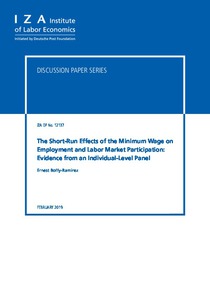The short-run effects of the minimum wage on employment and labor market participation: evidence from an individual-level panel

Institute of Labor Economics, Bonn
IZA - Bonn
2019
43 p.
minimum wage ; labour force participation ; unemployment
Discussion Paper
12137
Wages and wage payment systems
English
Bibliogr.
"Neumark, Salas, and Wascher (2014) succinctly summarize the empirical challenges researchers of the minimum wage face: "the identification of minimum wage effects requires both a sufficiently sharp focus on potentially affected workers and the construction of a valid counterfactual control group for what would have happened absent increases in the minimum wage." The difficulty of addressing these two challenges is evident in the variety of empirical approaches seen in the literature. In this paper, I address the latter of the issues in a manner nearly absent in the minimum wage literature by taking advantage of individual-level longitudinal data to observe the impacts of minimum wage changes on unemployment and labor force participation. Using within-individual variation and short 4-month panels, I control for heterogeneity at the individual level that determines unemployment and labor force participation. Specifically, the empirical strategy controls any fixed individual-specific idiosyncrasies and differential exposure to time-invariant economic shocks. This differs significantly from previous literature that exploits within-state variation. The short-run impacts of the minimum wage are assessed using monthly data, instead of yearly or quarterly data, which allows for the analysis of contemporaneous minimum wage effects. There is no evidence of an increase in unemployment immediately following a minimum wage increase. In addition, it does not appear that employers are substituting full-time workers with part-time workers. That said, there is robust evidence that immediately following a minimum wage increase, labor force participation decreases."
Digital
The ETUI is co-funded by the European Union. Views and opinions expressed are however those of the author(s) only and do not necessarily reflect those of the European Union or the ETUI.